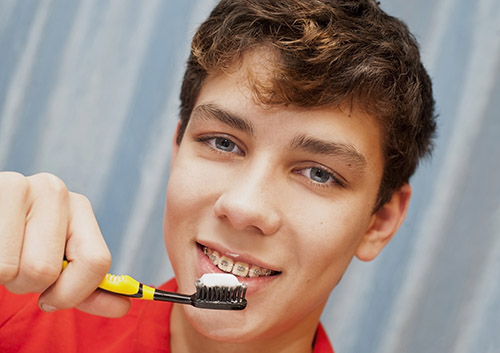February 25th, 2026

There are many great reasons to see an orthodontist. For a healthier bite. For straighter teeth. For a more confident smile. So why are you hesitating? If the visibility of traditional braces is what’s holding you back, ask Dr. Gregory Dyer about lingual braces.
With regular braces, brackets are bonded to the front of each tooth with a special adhesive. Ligatures around each bracket or bracket clips grip an archwire, which does the work of moving the teeth. The gentle pressure from the wire guides the teeth into alignment in gradual stages. Every adjustment moves the teeth to their perfect positions. These braces are quite effective—and they are usually quite visible.
Lingual braces, on the other hand, are virtually invisible. Lingual means “toward the tongue,” and this placement is the difference between lingual braces and more traditional types of orthodontic braces.
Lingual braces are custom designed to be applied to the inside of your teeth. Specially designed brackets are attached to the backs of the teeth. Individually crafted archwires are used to guide your teeth to their best alignment.
Lingual braces can be the solution to many orthodontic concerns:
- If you need or want invisible braces for personal or professional reasons, lingual braces are a great option. Because they are behind your teeth, they are even less noticeable than clear aligners—and you don’t need to keep track of your hours wearing them.
- Lingual braces keep the front of your teeth braces-free for playing a brass or reed instrument, or for participating in sports. (Just remember, a mouthguard is always a good idea for athletic activities, and especially when you wear braces.)
- Both brackets and wires can be customized to fit your teeth perfectly, and new lingual brackets and wires are more comfortable than ever.
You might be a good candidate for lingual braces if:
- You have a large enough tooth surface to place a bracket. Adults with small teeth—or children—might not be have enough room on the back of each tooth to hold a bracket.
- You don’t have a major malocclusion (bite problem) which would make lingual braces impractical. A deep overbite, for example, could cause the wires and brackets behind the upper teeth to come loose or detach as they come in contact with lower teeth.
- You are dedicated to keeping up with your oral hygiene. Because wires and brackets are behind the teeth, it can be harder to keep them free from food particles and plaque.
Finally, even if lingual braces aren’t the perfect match for your orthodontic needs, there are other options that can work for you. Smaller metal brackets, ceramic brackets that blend in with your enamel, and clear aligners mean today’s orthodontic work is more subtle and discreet than ever before.
For a healthier bite, for straighter teeth, for a more confident smile—don’t hesitate. Contact our Tampa office to discuss the many great options you have available to give you the smile you’ve always wanted—front and center.
February 18th, 2026

Modern dentistry has made the most of today’s technological innovations. And we’ve come a long way from the fraying sticks our ancestors used as toothbrushes.
On the other hand, while it’s a lot better than a fraying stick, the manual toothbrush model you’ve used for years might be ready for an upgrade. Should you take this opportunity to try out some new technology offering all the bells and whistles? Let’s answer that question by asking a few more questions.
Happy with your manual brush?
If you like your manual toothbrush and it’s doing the job, by all means, stick with it. But even your old familiar brush can evolve:
- There are lots of bristle options, but soft bristles are almost always the way to go. Medium and hard bristles can be too abrasive for your enamel.
- Heads come in a variety of sizes, so make sure the head size is comfortable. You want to be able to maneuver to reach every tooth surface, which a too-large brush head just can’t do.
- Try a different handle shape if you’re having trouble maneuvering and keeping a firm grip.
- Change your brush regularly. Brushes are effective for about three months before the bristles start to fray and breakdown. This is a good opportunity to experiment with different brands and styles.
Does your old brush suit your current needs?
Different types of manual toothbrushes are available for effective and comfortable brushing when you need options that a typical brush doesn’t provide:
- Special orthodontic toothbrushes are designed with bristles trimmed to fit around brackets and wires and smaller heads to reach into tight places.
- For those with mobility issues, brushes with larger or easy-grip handles make cleaning more comfortable.
- Brushes with extra-soft bristles are available if you have enamel erosion or sensitive gums.
- Because many women find their gums become especially sensitive during pregnancy, there are brushes designed especially for moms-to-be.
Is it time to go electric?
If you haven’t tried an electric toothbrush before, you might find that getting braces is a great reason to give one a spin.
- Electric toothbrushes can outperform manual models. A dedicated brusher might manage hundreds of brushstrokes for each minute of brushing, while an electric brush can provide thousands. If, despite your regular brushing, you have plaque build-up, an electric brush might be a good alternative to your manual brush.
- Models are available which can alert you when you’re brushing too hard—which is important for your enamel if you’re a heavy-handed brusher.
- If you tend to *think* you’ve brushed for the recommended two minutes, but have *actually* brushed 32 seconds, some electric brushes come with timers!
- There are tapered electric orthodontic brush heads designed just for people with braces.
- Electric brushes have bigger handles and can be easier to grip.
Is your current brush doing the job?
So, should you stick with the familiar toothbrush that’s worked for you all these years, or take this opportunity to try out some new technology that offers all the bells and whistles? The answer is clear: the right brush for you is the one that works!
If your regular checkups show that plaque is under control, you’re doing just fine with the brush in hand. If you or Dr. Gregory Dyer notice plaque buildup, it’s time to consider making some changes. Whether it’s a question of tools, techniques, or time spent brushing, your Tampa dental team has the answers you need for state-of-the-art dental hygiene.
February 11th, 2026

Our pets are a valued part of the family, but dogs and cats are not regularly known for their minty-fresh breath. Did you know that bad breath can be a sign of a more serious dental problem for your furry companion?
If you live with a pet or two, you’ll want to brush up on your animal dental knowledge and make sure everyone’s teeth stay healthy.
Proper dental care is essential to a pet’s overall well-being. About 80 percent of dogs and 70 percent of cats suffer from periodontal disease after the age of three.
Not only is this unhealthy for their mouth, it can lead to more serious health problems, including organ damage and heart failure. Toxins from periodontal disease seep into your pet’s bloodstream and have the potential to cause fatal organ damage.
Your veterinarian will check your pet’s teeth at an annual or six-month examination, but here are a few signs of periodontal disease you should watch for at home:
- Yellow/brown tartar
- Foul breath
- Red, inflamed, or bleeding gums
- Excessive drooling
- Pawing at the mouth or rubbing one’s jaw against objects
- Difficulty chewing
Aside from regular checkups at the vet, the best thing you can do for your pet is brush its teeth daily. Bacteria can recolonize onto the surface of teeth within 24 to 36 hours, so it’s essential to remove plaque before it turns into tartar. Ask your vet for a recommended toothbrush and pet toothpaste.
Dental hygiene chews can also help to reduce the effects of gingivitis, but some chews can actually make your pet’s oral health worse. Treats such as cow hooves, pig’s ears, and animal bones can damage teeth and cause other problems if ingested. Your vet can help you choose items that are healthiest for your pet.
Your dog’s favorite toys may also pose a threat to their oral health. Abrasive toys such as the popular green tennis balls can create wear and tear on the surface of pets’ teeth.
As with your own teeth, your dog or cat’s oral health plays a large role in its overall health. Remember to schedule regular checkups and ask your veterinarian for more tips on how to care for your pet’s teeth most effectively.
February 4th, 2026

It’s the littlest month of the year, so what better time to think about the dental health of our littlest family members? February is National Children’s Dental Health Month, and we’re here to suggest some of the best dental habits for healthy childhood smiles.
Babies
- Even before your baby cuts her first adorable tooth, you can start proactive dental care by gently wiping little gums with a clean, moist gauze pad or soft cloth twice a day. This removes bacteria and food particles and helps prepare your baby for brushing.
- When that first tooth does appear, or by age one if it hasn’t yet erupted, it’s time to schedule a visit to the dentist. At this first visit, your child’s dentist will check jaw and tooth development and can give expert guidance on teething, brushing, how much and which kind of toothpaste to use, and topics like thumb-sucking and pacifier use.
- When baby teeth arrive, use a small soft-bristled toothbrush designed to fit comfortably in tiny mouths.
- Use toothpaste as recommended. Children under the age of three who use paste should use a very small amount, no larger than a grain of rice.
- Prevent “baby bottle tooth decay”—don’t put your baby to bed with a bottle. This allows the sugars in formula or, when your child is 12 months or older, milk, to bathe the teeth throughout the night. And babies and toddlers never need sugary juices or sodas in those bottles!
Toddlers
- Help your child develop a positive relationship with his dental team. Read books or watch videos to help your child learn what to expect. Practice with him by having him open his mouth while you count his teeth. Plan visits when your child isn’t hungry or tired. Be positive yourself—your child will take his cues from you!
- Schedule regular appointments for exams and cleanings. Your child’s dentist will check tooth and jaw development, look for any signs of decay, and evaluate potential problems such as prolonged thumb sucking or pacifier use.
- By age three, children have most or all of their baby teeth. Use a soft bristled brush to clean your child’s teeth twice each day. As she grows, demonstrate how to brush properly. Your dentist and hygienist will have some great ideas on technique!
- Daily flossing should begin as soon as your child has two teeth which touch.
- Around age six, your child may be transitioning to solo brushing and flossing—but your oversight is still needed. Make sure all the surfaces of the teeth, including the tops of new molars, are brushed thoroughly. You might provide a timer or a two-minute song or video to make sure your child spends enough time brushing. Flossing can be tricky for young hands, so you’ll need to help with that task for a few years more.
School-Aged Children
- Orthodontists and dentists recommend a first visit to the orthodontist by age seven, or earlier if you notice your child has trouble chewing or biting, if the teeth don’t seem to fit together properly, or if you have any concerns about bite and alignment. When potential problems are discovered right away, early intervention can prevent more serious orthodontic issues from developing later. The team at GSD Orthodontics in Tampa is happy to answer any questions you might have about early interventions!
- If your child is beginning orthodontic treatment, you can help make the journey easier:
- Keep up with appointments and adjustments—missed appointments can delay your child’s progress.
- Braces can make brushing and flossing more difficult, so try special brushes and floss designed just for braces.
- If needed, remind your child to wear bands or aligners for the recommended number of hours each day.
- Be encouraging! Remind your child that these months in braces or aligners will lead to years of healthy, attractive smiles.
- Talk to your dentist about sealants. Permanent molars usually erupt between the ages of six and 12. Sealants are thin coatings which protect the chewing surfaces of these molars from food particles and cavity-causing bacteria which would otherwise collect inside grooves in the enamel.
- Children who play sports and engage in activities with a chance of physical contact should have a well-fitted mouthguard to protect their teeth. Be ready to replace it as often as recommended by Dr. Gregory Dyer or if it’s damaged.
- Increases in hormones during puberty can lead to puberty gingivitis, and swollen, red, and bleeding gums can be the result. Proactive dental hygiene will prevent gum disease from developing. Make sure your child brushes two minutes, twice a day, and flosses once per day. If symptoms persist, it’s time to see the dentist.
- A nutritious diet is essential for healthy teeth and gums. Give your child solid nutritional building blocks with a diet rich in proteins, vitamins, and minerals. If your child wears braces, have a variety of appealing, braces-friendly foods on hand.
Help your child enjoy a future of healthy, confident smiles by working in partnership with your child’s dentist and the orthodontic team at GSD Orthodontics. They are ready every month of the year with advice and expertise to make that healthy dental future a reality!












 Website Powered by Sesame 24-7™
Website Powered by Sesame 24-7™